MKT4066: Research Proposal on Brand Love for Tesco in the UK
VerifiedAdded on 2022/11/26
|11
|2551
|491
Project
AI Summary
This marketing research proposal investigates the concept of brand love within the context of Tesco, focusing on its influence on customer loyalty, trust, and engagement. The research aims to identify the key attributes contributing to brand love, evaluate strategies for enhancing it, and assess the impact of brand values and likeability. The methodology employs qualitative data collection through interviews with managers, complemented by secondary data analysis. The proposal outlines a detailed literature review covering concepts of brand love, trust, commitment, and their impact on consumer behavior, including word-of-mouth promotion and purchasing decisions. The research design incorporates exploratory, explanatory, and descriptive approaches, with a non-probability sampling method for data collection. The study also includes an action plan with a project timeline, and a comprehensive list of references. The research will be conducted ethically, ensuring the confidentiality of participants and the secure storage of research materials.
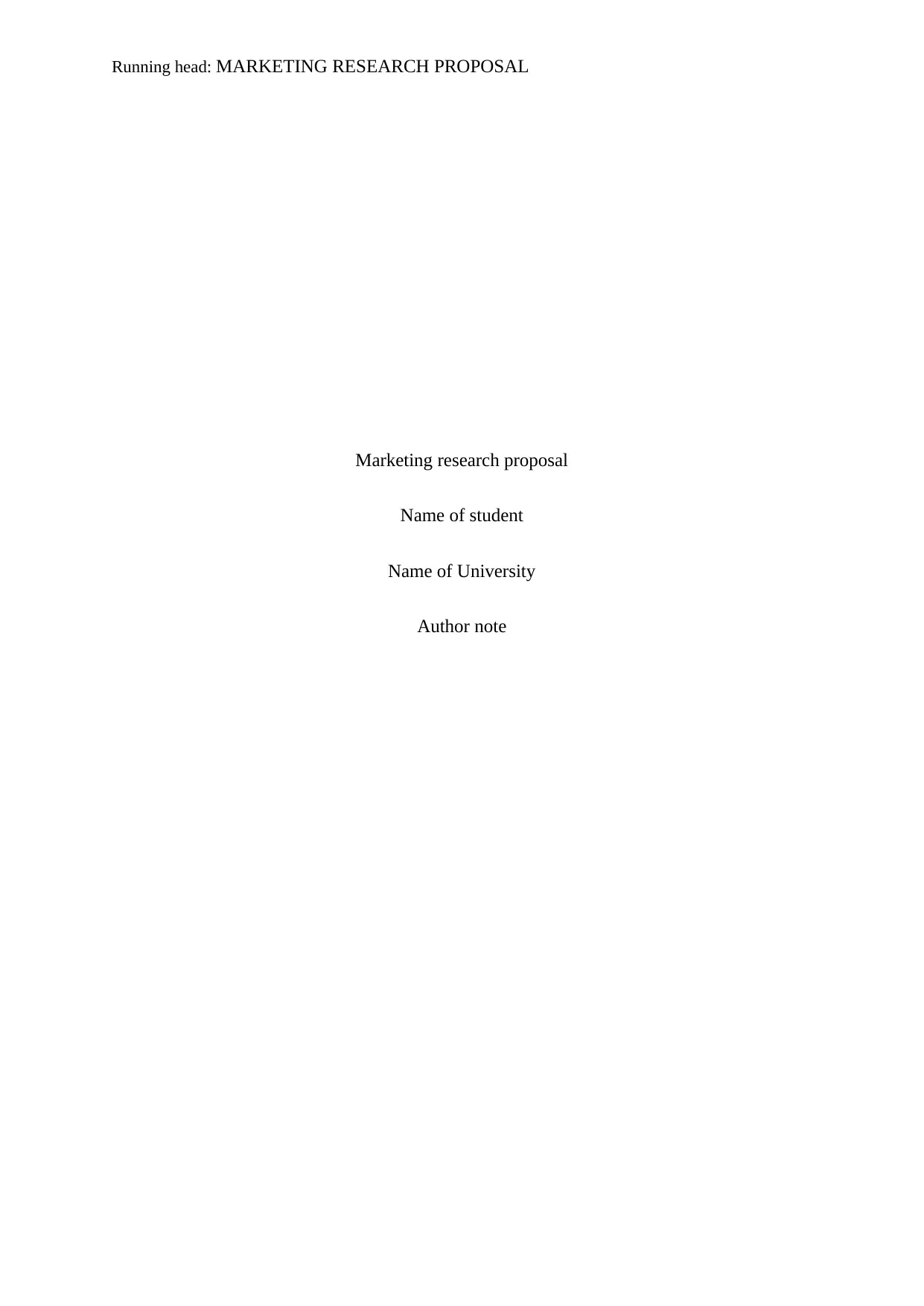
Running head: MARKETING RESEARCH PROPOSAL
Marketing research proposal
Name of student
Name of University
Author note
Marketing research proposal
Name of student
Name of University
Author note
Paraphrase This Document
Need a fresh take? Get an instant paraphrase of this document with our AI Paraphraser
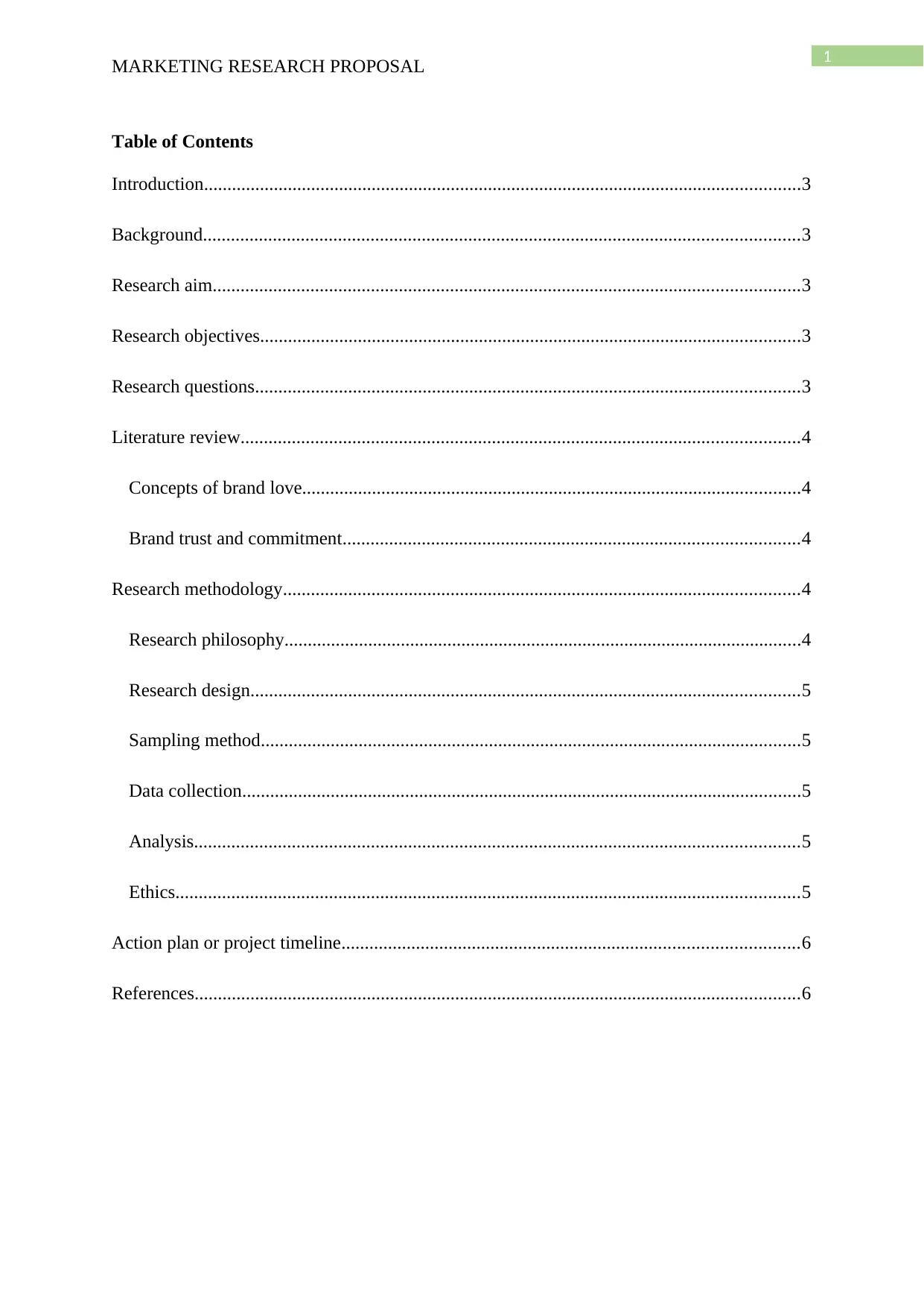
1
MARKETING RESEARCH PROPOSAL
Table of Contents
Introduction................................................................................................................................3
Background................................................................................................................................3
Research aim..............................................................................................................................3
Research objectives....................................................................................................................3
Research questions.....................................................................................................................3
Literature review........................................................................................................................4
Concepts of brand love...........................................................................................................4
Brand trust and commitment..................................................................................................4
Research methodology...............................................................................................................4
Research philosophy...............................................................................................................4
Research design......................................................................................................................5
Sampling method....................................................................................................................5
Data collection........................................................................................................................5
Analysis..................................................................................................................................5
Ethics......................................................................................................................................5
Action plan or project timeline..................................................................................................6
References..................................................................................................................................6
MARKETING RESEARCH PROPOSAL
Table of Contents
Introduction................................................................................................................................3
Background................................................................................................................................3
Research aim..............................................................................................................................3
Research objectives....................................................................................................................3
Research questions.....................................................................................................................3
Literature review........................................................................................................................4
Concepts of brand love...........................................................................................................4
Brand trust and commitment..................................................................................................4
Research methodology...............................................................................................................4
Research philosophy...............................................................................................................4
Research design......................................................................................................................5
Sampling method....................................................................................................................5
Data collection........................................................................................................................5
Analysis..................................................................................................................................5
Ethics......................................................................................................................................5
Action plan or project timeline..................................................................................................6
References..................................................................................................................................6
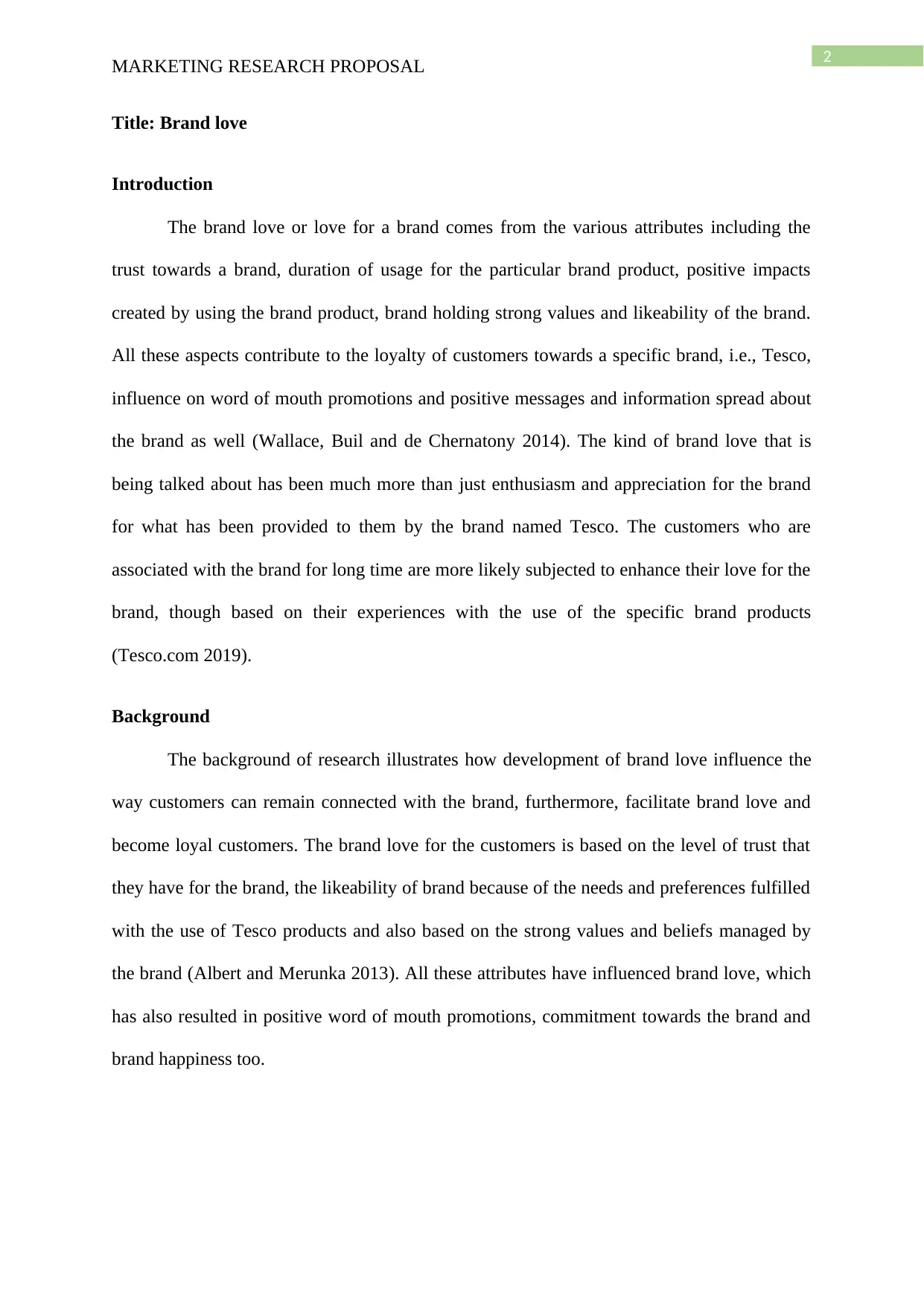
2
MARKETING RESEARCH PROPOSAL
Title: Brand love
Introduction
The brand love or love for a brand comes from the various attributes including the
trust towards a brand, duration of usage for the particular brand product, positive impacts
created by using the brand product, brand holding strong values and likeability of the brand.
All these aspects contribute to the loyalty of customers towards a specific brand, i.e., Tesco,
influence on word of mouth promotions and positive messages and information spread about
the brand as well (Wallace, Buil and de Chernatony 2014). The kind of brand love that is
being talked about has been much more than just enthusiasm and appreciation for the brand
for what has been provided to them by the brand named Tesco. The customers who are
associated with the brand for long time are more likely subjected to enhance their love for the
brand, though based on their experiences with the use of the specific brand products
(Tesco.com 2019).
Background
The background of research illustrates how development of brand love influence the
way customers can remain connected with the brand, furthermore, facilitate brand love and
become loyal customers. The brand love for the customers is based on the level of trust that
they have for the brand, the likeability of brand because of the needs and preferences fulfilled
with the use of Tesco products and also based on the strong values and beliefs managed by
the brand (Albert and Merunka 2013). All these attributes have influenced brand love, which
has also resulted in positive word of mouth promotions, commitment towards the brand and
brand happiness too.
MARKETING RESEARCH PROPOSAL
Title: Brand love
Introduction
The brand love or love for a brand comes from the various attributes including the
trust towards a brand, duration of usage for the particular brand product, positive impacts
created by using the brand product, brand holding strong values and likeability of the brand.
All these aspects contribute to the loyalty of customers towards a specific brand, i.e., Tesco,
influence on word of mouth promotions and positive messages and information spread about
the brand as well (Wallace, Buil and de Chernatony 2014). The kind of brand love that is
being talked about has been much more than just enthusiasm and appreciation for the brand
for what has been provided to them by the brand named Tesco. The customers who are
associated with the brand for long time are more likely subjected to enhance their love for the
brand, though based on their experiences with the use of the specific brand products
(Tesco.com 2019).
Background
The background of research illustrates how development of brand love influence the
way customers can remain connected with the brand, furthermore, facilitate brand love and
become loyal customers. The brand love for the customers is based on the level of trust that
they have for the brand, the likeability of brand because of the needs and preferences fulfilled
with the use of Tesco products and also based on the strong values and beliefs managed by
the brand (Albert and Merunka 2013). All these attributes have influenced brand love, which
has also resulted in positive word of mouth promotions, commitment towards the brand and
brand happiness too.
⊘ This is a preview!⊘
Do you want full access?
Subscribe today to unlock all pages.

Trusted by 1+ million students worldwide
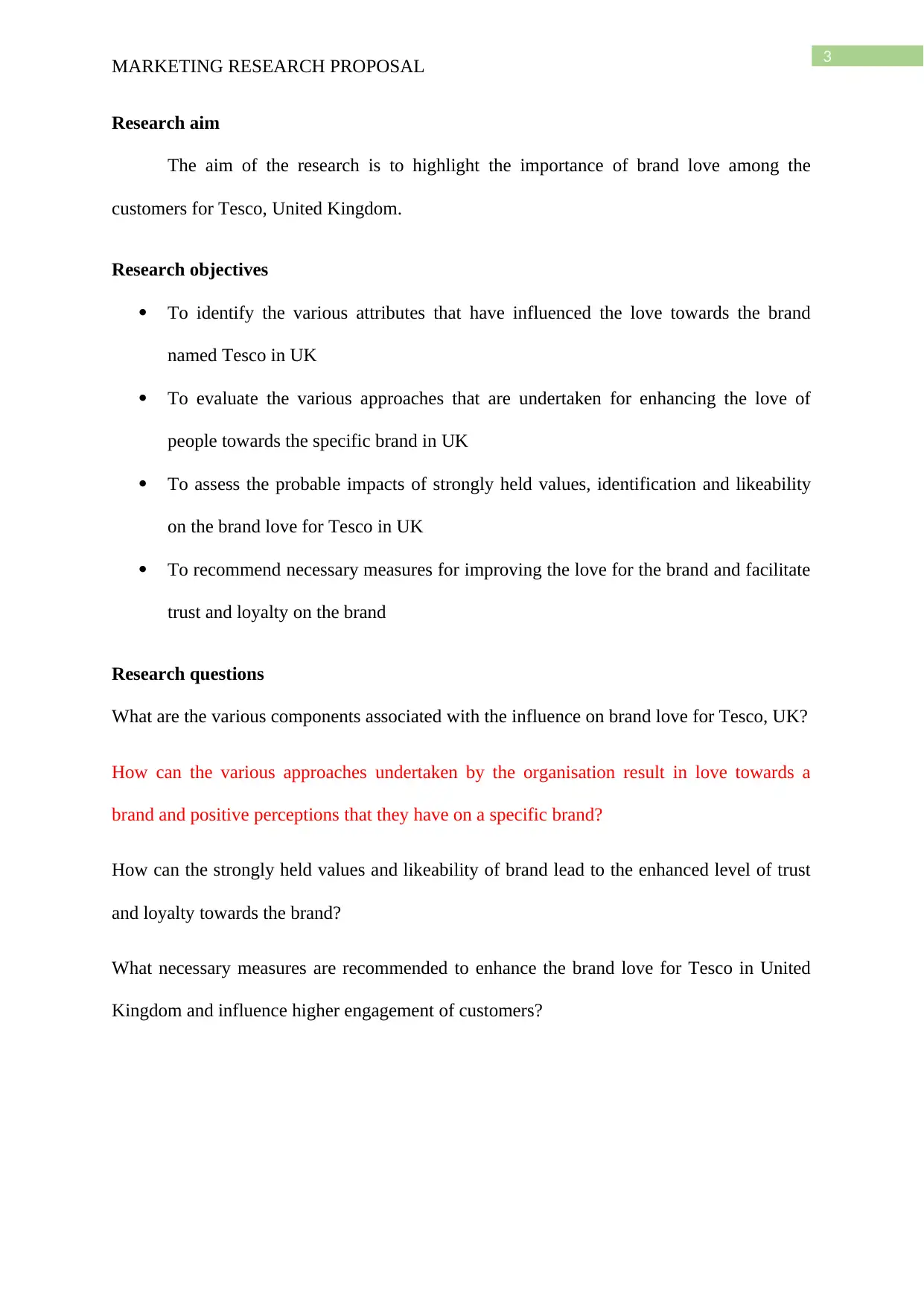
3
MARKETING RESEARCH PROPOSAL
Research aim
The aim of the research is to highlight the importance of brand love among the
customers for Tesco, United Kingdom.
Research objectives
To identify the various attributes that have influenced the love towards the brand
named Tesco in UK
To evaluate the various approaches that are undertaken for enhancing the love of
people towards the specific brand in UK
To assess the probable impacts of strongly held values, identification and likeability
on the brand love for Tesco in UK
To recommend necessary measures for improving the love for the brand and facilitate
trust and loyalty on the brand
Research questions
What are the various components associated with the influence on brand love for Tesco, UK?
How can the various approaches undertaken by the organisation result in love towards a
brand and positive perceptions that they have on a specific brand?
How can the strongly held values and likeability of brand lead to the enhanced level of trust
and loyalty towards the brand?
What necessary measures are recommended to enhance the brand love for Tesco in United
Kingdom and influence higher engagement of customers?
MARKETING RESEARCH PROPOSAL
Research aim
The aim of the research is to highlight the importance of brand love among the
customers for Tesco, United Kingdom.
Research objectives
To identify the various attributes that have influenced the love towards the brand
named Tesco in UK
To evaluate the various approaches that are undertaken for enhancing the love of
people towards the specific brand in UK
To assess the probable impacts of strongly held values, identification and likeability
on the brand love for Tesco in UK
To recommend necessary measures for improving the love for the brand and facilitate
trust and loyalty on the brand
Research questions
What are the various components associated with the influence on brand love for Tesco, UK?
How can the various approaches undertaken by the organisation result in love towards a
brand and positive perceptions that they have on a specific brand?
How can the strongly held values and likeability of brand lead to the enhanced level of trust
and loyalty towards the brand?
What necessary measures are recommended to enhance the brand love for Tesco in United
Kingdom and influence higher engagement of customers?
Paraphrase This Document
Need a fresh take? Get an instant paraphrase of this document with our AI Paraphraser
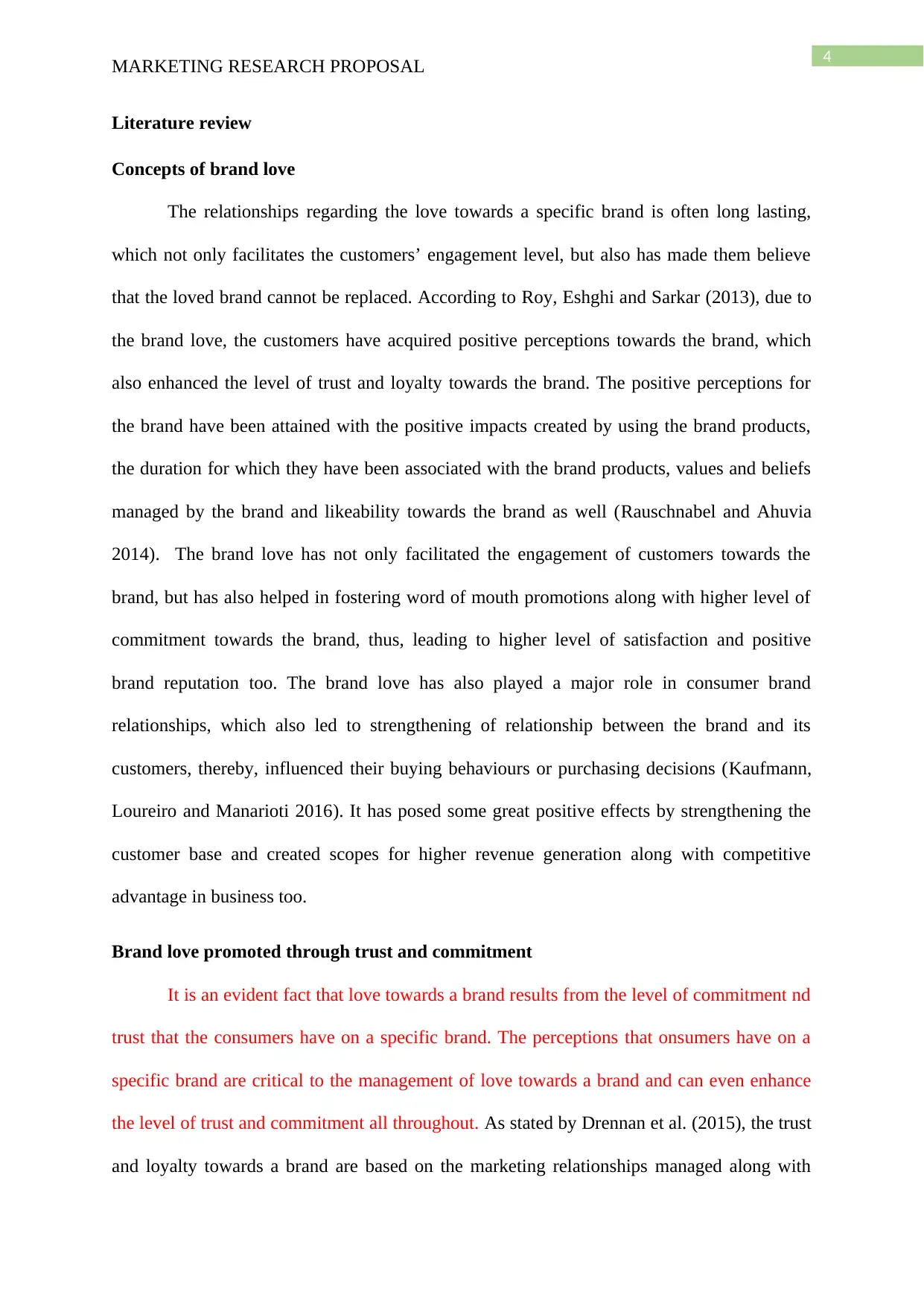
4
MARKETING RESEARCH PROPOSAL
Literature review
Concepts of brand love
The relationships regarding the love towards a specific brand is often long lasting,
which not only facilitates the customers’ engagement level, but also has made them believe
that the loved brand cannot be replaced. According to Roy, Eshghi and Sarkar (2013), due to
the brand love, the customers have acquired positive perceptions towards the brand, which
also enhanced the level of trust and loyalty towards the brand. The positive perceptions for
the brand have been attained with the positive impacts created by using the brand products,
the duration for which they have been associated with the brand products, values and beliefs
managed by the brand and likeability towards the brand as well (Rauschnabel and Ahuvia
2014). The brand love has not only facilitated the engagement of customers towards the
brand, but has also helped in fostering word of mouth promotions along with higher level of
commitment towards the brand, thus, leading to higher level of satisfaction and positive
brand reputation too. The brand love has also played a major role in consumer brand
relationships, which also led to strengthening of relationship between the brand and its
customers, thereby, influenced their buying behaviours or purchasing decisions (Kaufmann,
Loureiro and Manarioti 2016). It has posed some great positive effects by strengthening the
customer base and created scopes for higher revenue generation along with competitive
advantage in business too.
Brand love promoted through trust and commitment
It is an evident fact that love towards a brand results from the level of commitment nd
trust that the consumers have on a specific brand. The perceptions that onsumers have on a
specific brand are critical to the management of love towards a brand and can even enhance
the level of trust and commitment all throughout. As stated by Drennan et al. (2015), the trust
and loyalty towards a brand are based on the marketing relationships managed along with
MARKETING RESEARCH PROPOSAL
Literature review
Concepts of brand love
The relationships regarding the love towards a specific brand is often long lasting,
which not only facilitates the customers’ engagement level, but also has made them believe
that the loved brand cannot be replaced. According to Roy, Eshghi and Sarkar (2013), due to
the brand love, the customers have acquired positive perceptions towards the brand, which
also enhanced the level of trust and loyalty towards the brand. The positive perceptions for
the brand have been attained with the positive impacts created by using the brand products,
the duration for which they have been associated with the brand products, values and beliefs
managed by the brand and likeability towards the brand as well (Rauschnabel and Ahuvia
2014). The brand love has not only facilitated the engagement of customers towards the
brand, but has also helped in fostering word of mouth promotions along with higher level of
commitment towards the brand, thus, leading to higher level of satisfaction and positive
brand reputation too. The brand love has also played a major role in consumer brand
relationships, which also led to strengthening of relationship between the brand and its
customers, thereby, influenced their buying behaviours or purchasing decisions (Kaufmann,
Loureiro and Manarioti 2016). It has posed some great positive effects by strengthening the
customer base and created scopes for higher revenue generation along with competitive
advantage in business too.
Brand love promoted through trust and commitment
It is an evident fact that love towards a brand results from the level of commitment nd
trust that the consumers have on a specific brand. The perceptions that onsumers have on a
specific brand are critical to the management of love towards a brand and can even enhance
the level of trust and commitment all throughout. As stated by Drennan et al. (2015), the trust
and loyalty towards a brand are based on the marketing relationships managed along with
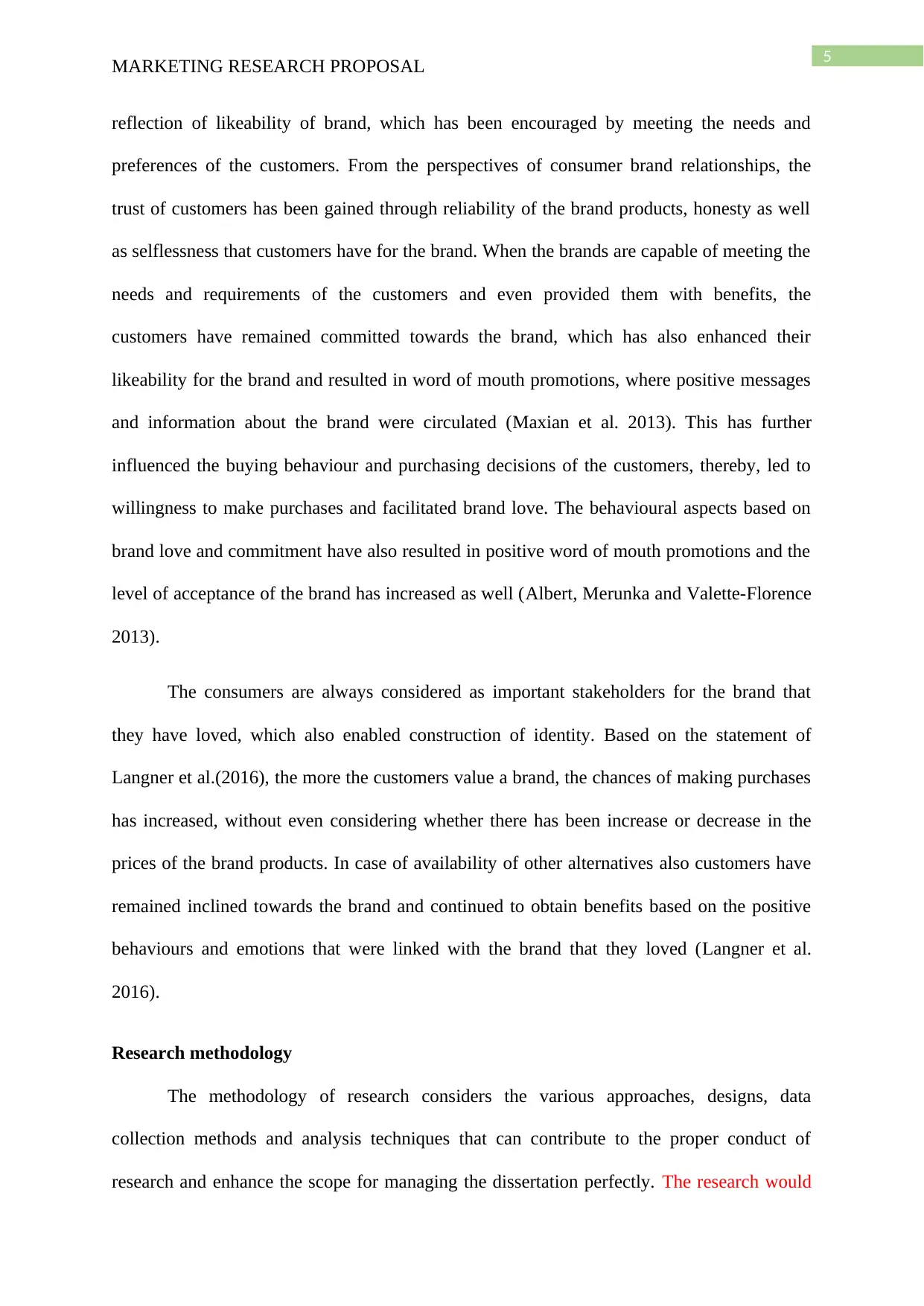
5
MARKETING RESEARCH PROPOSAL
reflection of likeability of brand, which has been encouraged by meeting the needs and
preferences of the customers. From the perspectives of consumer brand relationships, the
trust of customers has been gained through reliability of the brand products, honesty as well
as selflessness that customers have for the brand. When the brands are capable of meeting the
needs and requirements of the customers and even provided them with benefits, the
customers have remained committed towards the brand, which has also enhanced their
likeability for the brand and resulted in word of mouth promotions, where positive messages
and information about the brand were circulated (Maxian et al. 2013). This has further
influenced the buying behaviour and purchasing decisions of the customers, thereby, led to
willingness to make purchases and facilitated brand love. The behavioural aspects based on
brand love and commitment have also resulted in positive word of mouth promotions and the
level of acceptance of the brand has increased as well (Albert, Merunka and Valette-Florence
2013).
The consumers are always considered as important stakeholders for the brand that
they have loved, which also enabled construction of identity. Based on the statement of
Langner et al.(2016), the more the customers value a brand, the chances of making purchases
has increased, without even considering whether there has been increase or decrease in the
prices of the brand products. In case of availability of other alternatives also customers have
remained inclined towards the brand and continued to obtain benefits based on the positive
behaviours and emotions that were linked with the brand that they loved (Langner et al.
2016).
Research methodology
The methodology of research considers the various approaches, designs, data
collection methods and analysis techniques that can contribute to the proper conduct of
research and enhance the scope for managing the dissertation perfectly. The research would
MARKETING RESEARCH PROPOSAL
reflection of likeability of brand, which has been encouraged by meeting the needs and
preferences of the customers. From the perspectives of consumer brand relationships, the
trust of customers has been gained through reliability of the brand products, honesty as well
as selflessness that customers have for the brand. When the brands are capable of meeting the
needs and requirements of the customers and even provided them with benefits, the
customers have remained committed towards the brand, which has also enhanced their
likeability for the brand and resulted in word of mouth promotions, where positive messages
and information about the brand were circulated (Maxian et al. 2013). This has further
influenced the buying behaviour and purchasing decisions of the customers, thereby, led to
willingness to make purchases and facilitated brand love. The behavioural aspects based on
brand love and commitment have also resulted in positive word of mouth promotions and the
level of acceptance of the brand has increased as well (Albert, Merunka and Valette-Florence
2013).
The consumers are always considered as important stakeholders for the brand that
they have loved, which also enabled construction of identity. Based on the statement of
Langner et al.(2016), the more the customers value a brand, the chances of making purchases
has increased, without even considering whether there has been increase or decrease in the
prices of the brand products. In case of availability of other alternatives also customers have
remained inclined towards the brand and continued to obtain benefits based on the positive
behaviours and emotions that were linked with the brand that they loved (Langner et al.
2016).
Research methodology
The methodology of research considers the various approaches, designs, data
collection methods and analysis techniques that can contribute to the proper conduct of
research and enhance the scope for managing the dissertation perfectly. The research would
⊘ This is a preview!⊘
Do you want full access?
Subscribe today to unlock all pages.

Trusted by 1+ million students worldwide
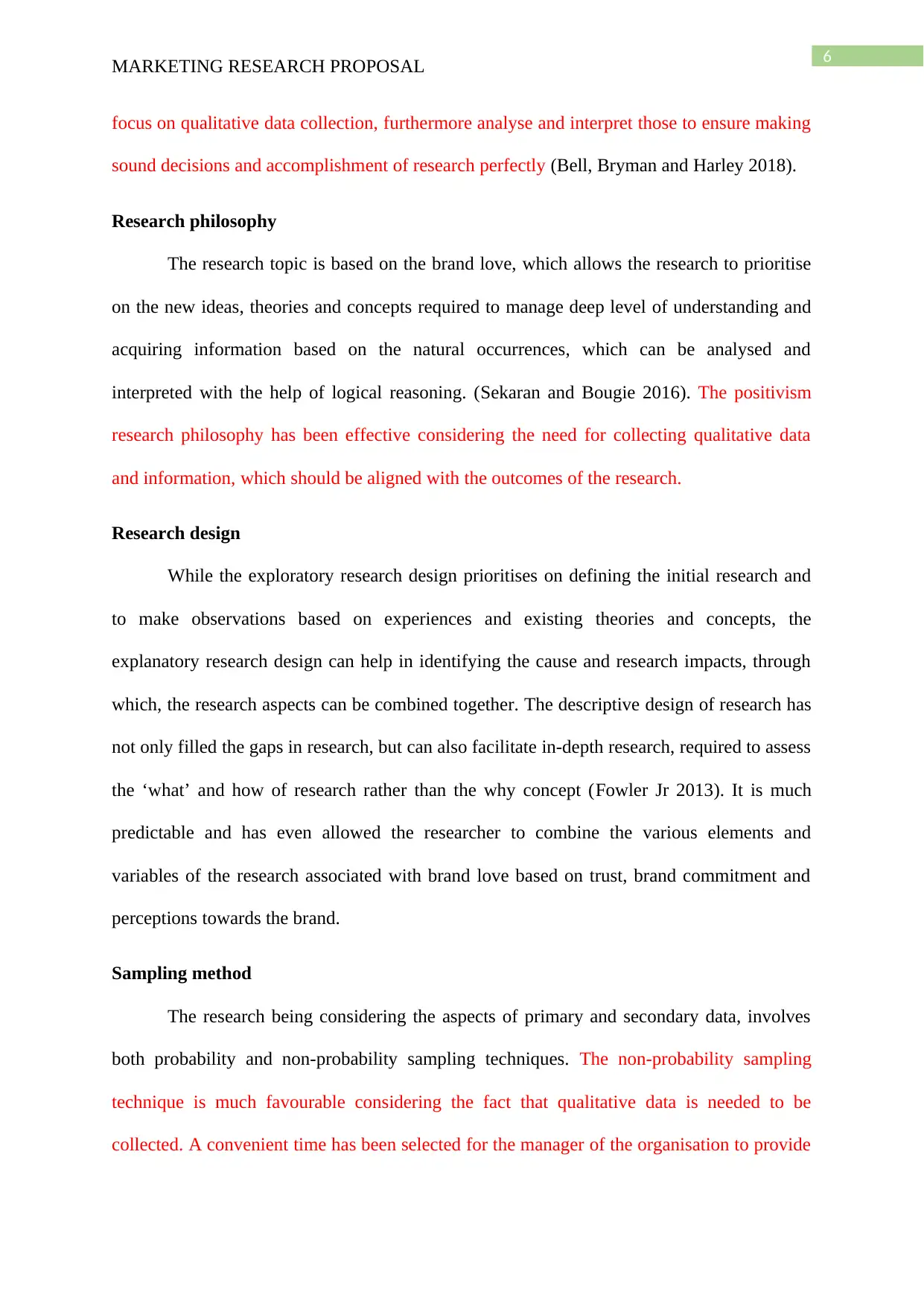
6
MARKETING RESEARCH PROPOSAL
focus on qualitative data collection, furthermore analyse and interpret those to ensure making
sound decisions and accomplishment of research perfectly (Bell, Bryman and Harley 2018).
Research philosophy
The research topic is based on the brand love, which allows the research to prioritise
on the new ideas, theories and concepts required to manage deep level of understanding and
acquiring information based on the natural occurrences, which can be analysed and
interpreted with the help of logical reasoning. (Sekaran and Bougie 2016). The positivism
research philosophy has been effective considering the need for collecting qualitative data
and information, which should be aligned with the outcomes of the research.
Research design
While the exploratory research design prioritises on defining the initial research and
to make observations based on experiences and existing theories and concepts, the
explanatory research design can help in identifying the cause and research impacts, through
which, the research aspects can be combined together. The descriptive design of research has
not only filled the gaps in research, but can also facilitate in-depth research, required to assess
the ‘what’ and how of research rather than the why concept (Fowler Jr 2013). It is much
predictable and has even allowed the researcher to combine the various elements and
variables of the research associated with brand love based on trust, brand commitment and
perceptions towards the brand.
Sampling method
The research being considering the aspects of primary and secondary data, involves
both probability and non-probability sampling techniques. The non-probability sampling
technique is much favourable considering the fact that qualitative data is needed to be
collected. A convenient time has been selected for the manager of the organisation to provide
MARKETING RESEARCH PROPOSAL
focus on qualitative data collection, furthermore analyse and interpret those to ensure making
sound decisions and accomplishment of research perfectly (Bell, Bryman and Harley 2018).
Research philosophy
The research topic is based on the brand love, which allows the research to prioritise
on the new ideas, theories and concepts required to manage deep level of understanding and
acquiring information based on the natural occurrences, which can be analysed and
interpreted with the help of logical reasoning. (Sekaran and Bougie 2016). The positivism
research philosophy has been effective considering the need for collecting qualitative data
and information, which should be aligned with the outcomes of the research.
Research design
While the exploratory research design prioritises on defining the initial research and
to make observations based on experiences and existing theories and concepts, the
explanatory research design can help in identifying the cause and research impacts, through
which, the research aspects can be combined together. The descriptive design of research has
not only filled the gaps in research, but can also facilitate in-depth research, required to assess
the ‘what’ and how of research rather than the why concept (Fowler Jr 2013). It is much
predictable and has even allowed the researcher to combine the various elements and
variables of the research associated with brand love based on trust, brand commitment and
perceptions towards the brand.
Sampling method
The research being considering the aspects of primary and secondary data, involves
both probability and non-probability sampling techniques. The non-probability sampling
technique is much favourable considering the fact that qualitative data is needed to be
collected. A convenient time has been selected for the manager of the organisation to provide
Paraphrase This Document
Need a fresh take? Get an instant paraphrase of this document with our AI Paraphraser
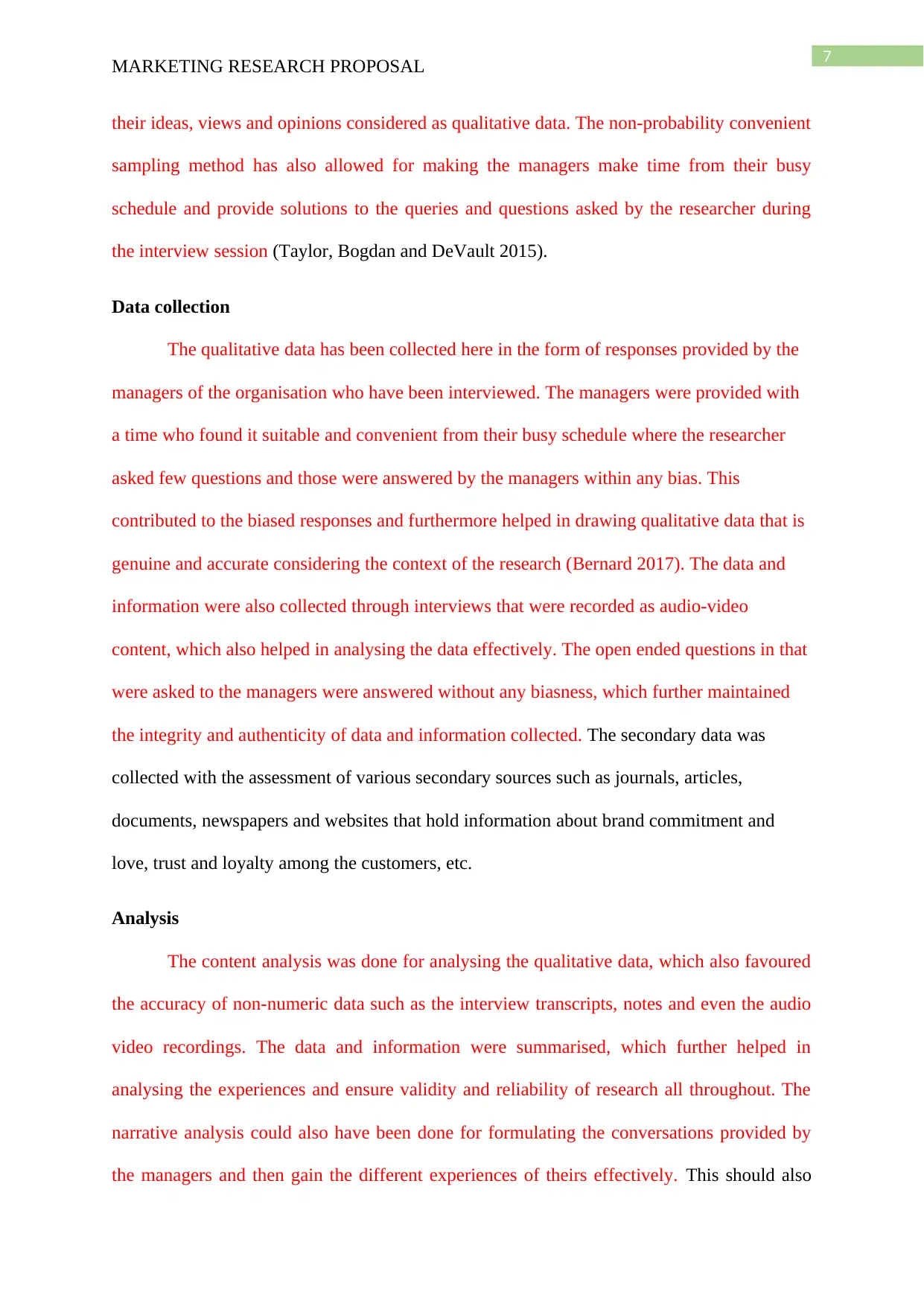
7
MARKETING RESEARCH PROPOSAL
their ideas, views and opinions considered as qualitative data. The non-probability convenient
sampling method has also allowed for making the managers make time from their busy
schedule and provide solutions to the queries and questions asked by the researcher during
the interview session (Taylor, Bogdan and DeVault 2015).
Data collection
The qualitative data has been collected here in the form of responses provided by the
managers of the organisation who have been interviewed. The managers were provided with
a time who found it suitable and convenient from their busy schedule where the researcher
asked few questions and those were answered by the managers within any bias. This
contributed to the biased responses and furthermore helped in drawing qualitative data that is
genuine and accurate considering the context of the research (Bernard 2017). The data and
information were also collected through interviews that were recorded as audio-video
content, which also helped in analysing the data effectively. The open ended questions in that
were asked to the managers were answered without any biasness, which further maintained
the integrity and authenticity of data and information collected. The secondary data was
collected with the assessment of various secondary sources such as journals, articles,
documents, newspapers and websites that hold information about brand commitment and
love, trust and loyalty among the customers, etc.
Analysis
The content analysis was done for analysing the qualitative data, which also favoured
the accuracy of non-numeric data such as the interview transcripts, notes and even the audio
video recordings. The data and information were summarised, which further helped in
analysing the experiences and ensure validity and reliability of research all throughout. The
narrative analysis could also have been done for formulating the conversations provided by
the managers and then gain the different experiences of theirs effectively. This should also
MARKETING RESEARCH PROPOSAL
their ideas, views and opinions considered as qualitative data. The non-probability convenient
sampling method has also allowed for making the managers make time from their busy
schedule and provide solutions to the queries and questions asked by the researcher during
the interview session (Taylor, Bogdan and DeVault 2015).
Data collection
The qualitative data has been collected here in the form of responses provided by the
managers of the organisation who have been interviewed. The managers were provided with
a time who found it suitable and convenient from their busy schedule where the researcher
asked few questions and those were answered by the managers within any bias. This
contributed to the biased responses and furthermore helped in drawing qualitative data that is
genuine and accurate considering the context of the research (Bernard 2017). The data and
information were also collected through interviews that were recorded as audio-video
content, which also helped in analysing the data effectively. The open ended questions in that
were asked to the managers were answered without any biasness, which further maintained
the integrity and authenticity of data and information collected. The secondary data was
collected with the assessment of various secondary sources such as journals, articles,
documents, newspapers and websites that hold information about brand commitment and
love, trust and loyalty among the customers, etc.
Analysis
The content analysis was done for analysing the qualitative data, which also favoured
the accuracy of non-numeric data such as the interview transcripts, notes and even the audio
video recordings. The data and information were summarised, which further helped in
analysing the experiences and ensure validity and reliability of research all throughout. The
narrative analysis could also have been done for formulating the conversations provided by
the managers and then gain the different experiences of theirs effectively. This should also
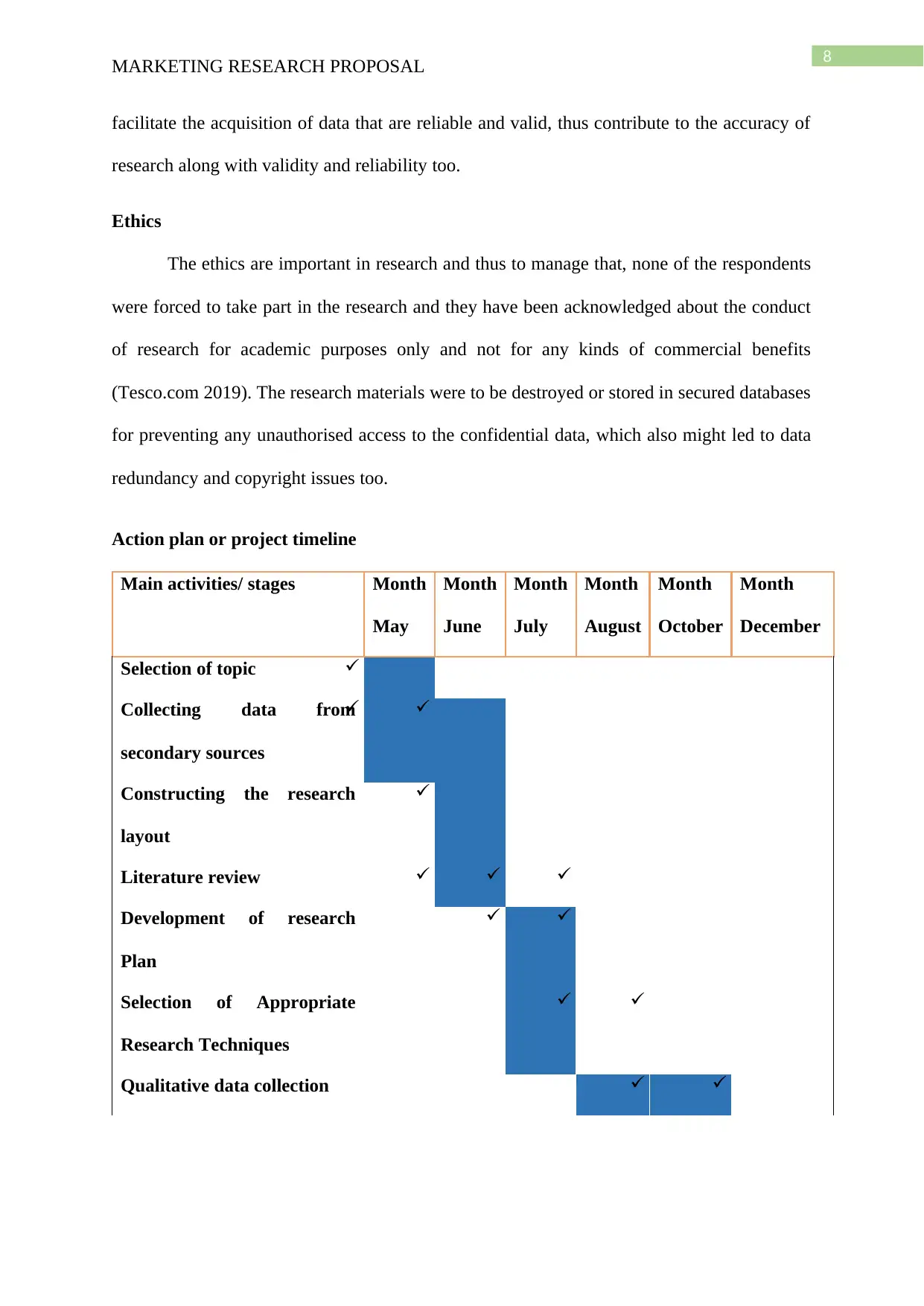
8
MARKETING RESEARCH PROPOSAL
facilitate the acquisition of data that are reliable and valid, thus contribute to the accuracy of
research along with validity and reliability too.
Ethics
The ethics are important in research and thus to manage that, none of the respondents
were forced to take part in the research and they have been acknowledged about the conduct
of research for academic purposes only and not for any kinds of commercial benefits
(Tesco.com 2019). The research materials were to be destroyed or stored in secured databases
for preventing any unauthorised access to the confidential data, which also might led to data
redundancy and copyright issues too.
Action plan or project timeline
Main activities/ stages Month
May
Month
June
Month
July
Month
August
Month
October
Month
December
Selection of topic
Collecting data from
secondary sources
Constructing the research
layout
Literature review
Development of research
Plan
Selection of Appropriate
Research Techniques
Qualitative data collection
MARKETING RESEARCH PROPOSAL
facilitate the acquisition of data that are reliable and valid, thus contribute to the accuracy of
research along with validity and reliability too.
Ethics
The ethics are important in research and thus to manage that, none of the respondents
were forced to take part in the research and they have been acknowledged about the conduct
of research for academic purposes only and not for any kinds of commercial benefits
(Tesco.com 2019). The research materials were to be destroyed or stored in secured databases
for preventing any unauthorised access to the confidential data, which also might led to data
redundancy and copyright issues too.
Action plan or project timeline
Main activities/ stages Month
May
Month
June
Month
July
Month
August
Month
October
Month
December
Selection of topic
Collecting data from
secondary sources
Constructing the research
layout
Literature review
Development of research
Plan
Selection of Appropriate
Research Techniques
Qualitative data collection
⊘ This is a preview!⊘
Do you want full access?
Subscribe today to unlock all pages.

Trusted by 1+ million students worldwide
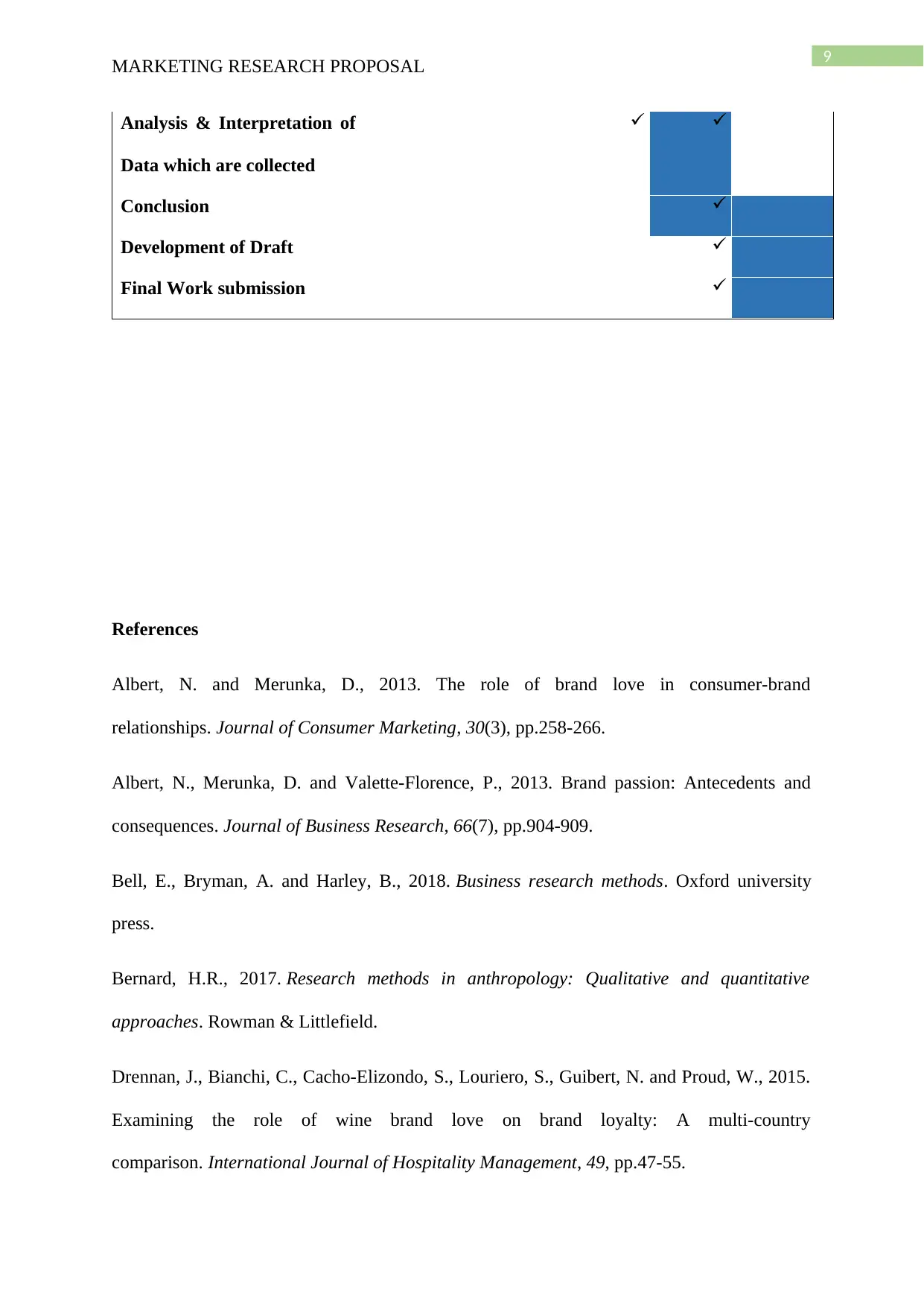
9
MARKETING RESEARCH PROPOSAL
Analysis & Interpretation of
Data which are collected
Conclusion
Development of Draft
Final Work submission
References
Albert, N. and Merunka, D., 2013. The role of brand love in consumer-brand
relationships. Journal of Consumer Marketing, 30(3), pp.258-266.
Albert, N., Merunka, D. and Valette-Florence, P., 2013. Brand passion: Antecedents and
consequences. Journal of Business Research, 66(7), pp.904-909.
Bell, E., Bryman, A. and Harley, B., 2018. Business research methods. Oxford university
press.
Bernard, H.R., 2017. Research methods in anthropology: Qualitative and quantitative
approaches. Rowman & Littlefield.
Drennan, J., Bianchi, C., Cacho-Elizondo, S., Louriero, S., Guibert, N. and Proud, W., 2015.
Examining the role of wine brand love on brand loyalty: A multi-country
comparison. International Journal of Hospitality Management, 49, pp.47-55.
MARKETING RESEARCH PROPOSAL
Analysis & Interpretation of
Data which are collected
Conclusion
Development of Draft
Final Work submission
References
Albert, N. and Merunka, D., 2013. The role of brand love in consumer-brand
relationships. Journal of Consumer Marketing, 30(3), pp.258-266.
Albert, N., Merunka, D. and Valette-Florence, P., 2013. Brand passion: Antecedents and
consequences. Journal of Business Research, 66(7), pp.904-909.
Bell, E., Bryman, A. and Harley, B., 2018. Business research methods. Oxford university
press.
Bernard, H.R., 2017. Research methods in anthropology: Qualitative and quantitative
approaches. Rowman & Littlefield.
Drennan, J., Bianchi, C., Cacho-Elizondo, S., Louriero, S., Guibert, N. and Proud, W., 2015.
Examining the role of wine brand love on brand loyalty: A multi-country
comparison. International Journal of Hospitality Management, 49, pp.47-55.
Paraphrase This Document
Need a fresh take? Get an instant paraphrase of this document with our AI Paraphraser
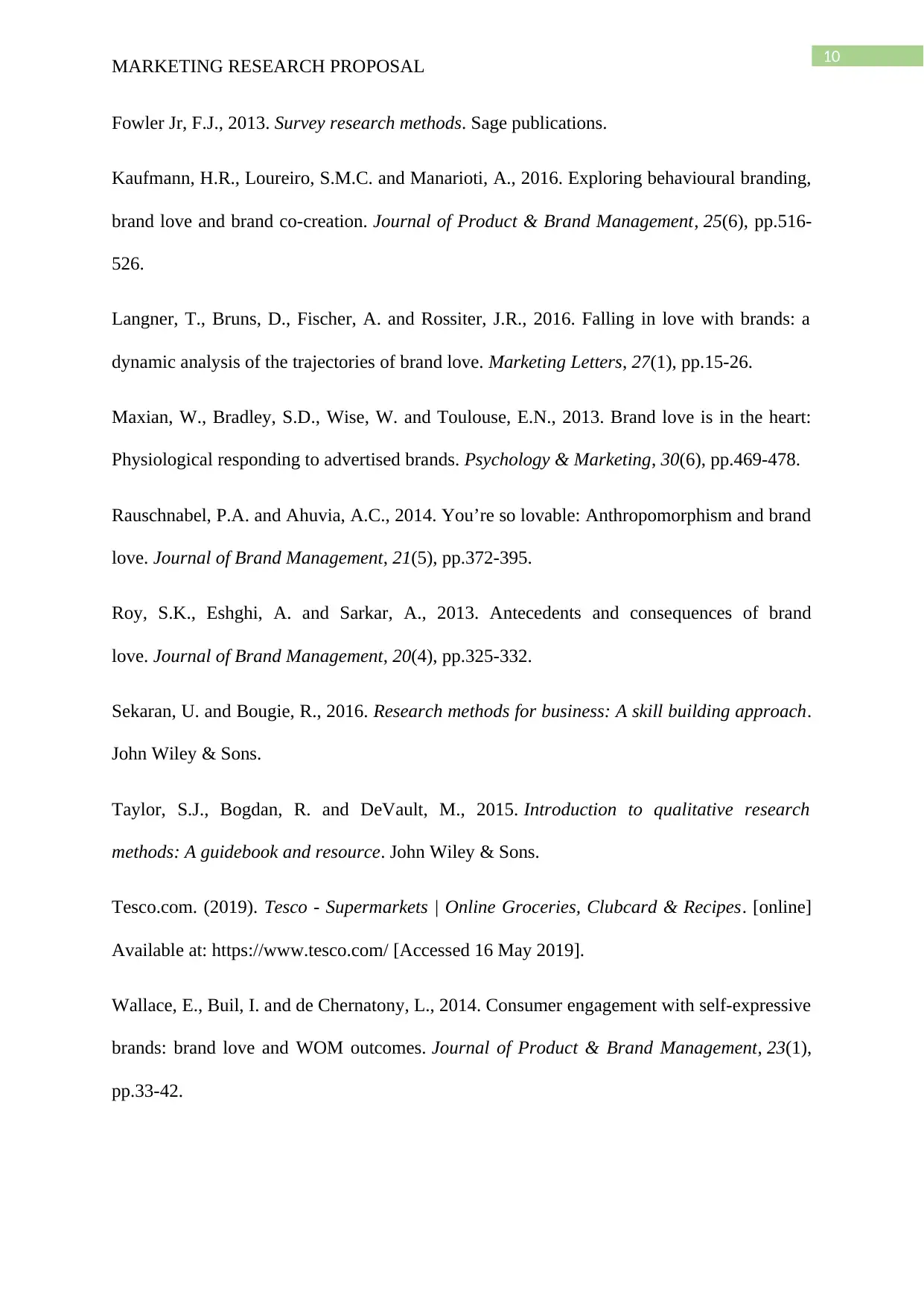
10
MARKETING RESEARCH PROPOSAL
Fowler Jr, F.J., 2013. Survey research methods. Sage publications.
Kaufmann, H.R., Loureiro, S.M.C. and Manarioti, A., 2016. Exploring behavioural branding,
brand love and brand co-creation. Journal of Product & Brand Management, 25(6), pp.516-
526.
Langner, T., Bruns, D., Fischer, A. and Rossiter, J.R., 2016. Falling in love with brands: a
dynamic analysis of the trajectories of brand love. Marketing Letters, 27(1), pp.15-26.
Maxian, W., Bradley, S.D., Wise, W. and Toulouse, E.N., 2013. Brand love is in the heart:
Physiological responding to advertised brands. Psychology & Marketing, 30(6), pp.469-478.
Rauschnabel, P.A. and Ahuvia, A.C., 2014. You’re so lovable: Anthropomorphism and brand
love. Journal of Brand Management, 21(5), pp.372-395.
Roy, S.K., Eshghi, A. and Sarkar, A., 2013. Antecedents and consequences of brand
love. Journal of Brand Management, 20(4), pp.325-332.
Sekaran, U. and Bougie, R., 2016. Research methods for business: A skill building approach.
John Wiley & Sons.
Taylor, S.J., Bogdan, R. and DeVault, M., 2015. Introduction to qualitative research
methods: A guidebook and resource. John Wiley & Sons.
Tesco.com. (2019). Tesco - Supermarkets | Online Groceries, Clubcard & Recipes. [online]
Available at: https://www.tesco.com/ [Accessed 16 May 2019].
Wallace, E., Buil, I. and de Chernatony, L., 2014. Consumer engagement with self-expressive
brands: brand love and WOM outcomes. Journal of Product & Brand Management, 23(1),
pp.33-42.
MARKETING RESEARCH PROPOSAL
Fowler Jr, F.J., 2013. Survey research methods. Sage publications.
Kaufmann, H.R., Loureiro, S.M.C. and Manarioti, A., 2016. Exploring behavioural branding,
brand love and brand co-creation. Journal of Product & Brand Management, 25(6), pp.516-
526.
Langner, T., Bruns, D., Fischer, A. and Rossiter, J.R., 2016. Falling in love with brands: a
dynamic analysis of the trajectories of brand love. Marketing Letters, 27(1), pp.15-26.
Maxian, W., Bradley, S.D., Wise, W. and Toulouse, E.N., 2013. Brand love is in the heart:
Physiological responding to advertised brands. Psychology & Marketing, 30(6), pp.469-478.
Rauschnabel, P.A. and Ahuvia, A.C., 2014. You’re so lovable: Anthropomorphism and brand
love. Journal of Brand Management, 21(5), pp.372-395.
Roy, S.K., Eshghi, A. and Sarkar, A., 2013. Antecedents and consequences of brand
love. Journal of Brand Management, 20(4), pp.325-332.
Sekaran, U. and Bougie, R., 2016. Research methods for business: A skill building approach.
John Wiley & Sons.
Taylor, S.J., Bogdan, R. and DeVault, M., 2015. Introduction to qualitative research
methods: A guidebook and resource. John Wiley & Sons.
Tesco.com. (2019). Tesco - Supermarkets | Online Groceries, Clubcard & Recipes. [online]
Available at: https://www.tesco.com/ [Accessed 16 May 2019].
Wallace, E., Buil, I. and de Chernatony, L., 2014. Consumer engagement with self-expressive
brands: brand love and WOM outcomes. Journal of Product & Brand Management, 23(1),
pp.33-42.
1 out of 11
Related Documents
Your All-in-One AI-Powered Toolkit for Academic Success.
+13062052269
info@desklib.com
Available 24*7 on WhatsApp / Email
![[object Object]](/_next/static/media/star-bottom.7253800d.svg)
Unlock your academic potential
Copyright © 2020–2025 A2Z Services. All Rights Reserved. Developed and managed by ZUCOL.




